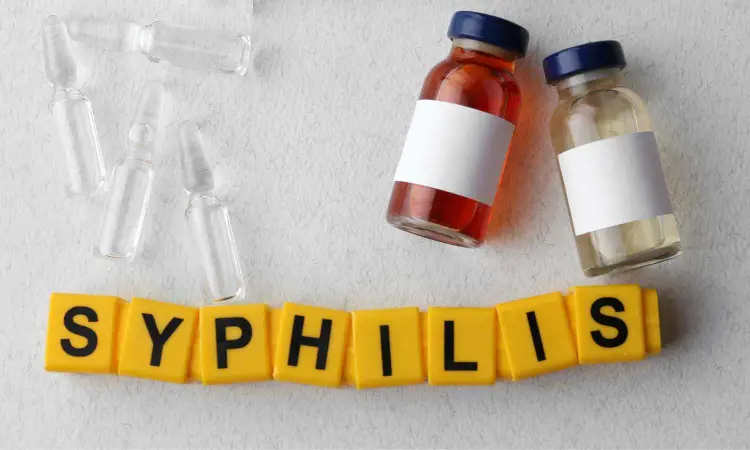- Home
- Medical news & Guidelines
- Anesthesiology
- Cardiology and CTVS
- Critical Care
- Dentistry
- Dermatology
- Diabetes and Endocrinology
- ENT
- Gastroenterology
- Medicine
- Nephrology
- Neurology
- Obstretics-Gynaecology
- Oncology
- Ophthalmology
- Orthopaedics
- Pediatrics-Neonatology
- Psychiatry
- Pulmonology
- Radiology
- Surgery
- Urology
- Laboratory Medicine
- Diet
- Nursing
- Paramedical
- Physiotherapy
- Health news
- Fact Check
- Bone Health Fact Check
- Brain Health Fact Check
- Cancer Related Fact Check
- Child Care Fact Check
- Dental and oral health fact check
- Diabetes and metabolic health fact check
- Diet and Nutrition Fact Check
- Eye and ENT Care Fact Check
- Fitness fact check
- Gut health fact check
- Heart health fact check
- Kidney health fact check
- Medical education fact check
- Men's health fact check
- Respiratory fact check
- Skin and hair care fact check
- Vaccine and Immunization fact check
- Women's health fact check
- AYUSH
- State News
- Andaman and Nicobar Islands
- Andhra Pradesh
- Arunachal Pradesh
- Assam
- Bihar
- Chandigarh
- Chattisgarh
- Dadra and Nagar Haveli
- Daman and Diu
- Delhi
- Goa
- Gujarat
- Haryana
- Himachal Pradesh
- Jammu & Kashmir
- Jharkhand
- Karnataka
- Kerala
- Ladakh
- Lakshadweep
- Madhya Pradesh
- Maharashtra
- Manipur
- Meghalaya
- Mizoram
- Nagaland
- Odisha
- Puducherry
- Punjab
- Rajasthan
- Sikkim
- Tamil Nadu
- Telangana
- Tripura
- Uttar Pradesh
- Uttrakhand
- West Bengal
- Medical Education
- Industry
Prenatal Syphilis Exposure Linked to Higher Hospitalization Risk in Children: JAMA

A new study published in the Journal of American Medical Association found that children exposed to syphilis during pregnancy, even without congenital infection at birth, faced increased risk of hospital admissions and longer hospital stays. The study highlighted the need for close follow-up and prevention efforts in women of childbearing age.
The long-term consequences and effects on children exposed to syphilis during pregnancy but without a congenital infection identified at birth are still unknown, despite the fact that the short-term effects of congenital syphilis are well established. Thus, to examine the rates of hospitalization for all causes in children under five years old between those who were exposed to syphilis during pregnancy (with or without congenital syphilis) and those who were not, Enny Paixão and her colleagues carried out this study.
This population-based study included singleton live births from January 1, 2011, to December 31, 2015, after utilizing linked data from the Center of Data and Knowledge Integration for Health Birth Cohort. Until they turned five, passed away, or died on December 31, 2018, the children were monitored. Between March and September 2024, data that had been made public in 2020 were examined. Maternal syphilis, congenital syphilis, and no exposure, for individuals lacking syphilis records, were the three categories into which syphilis during pregnancy was divided in this study.
Of the 82,86,867 singleton newborns in the research, 30,039 had maternal syphilis exposure, and 36,443 had congenital syphilis. Black, unmarried, and less educated women were more likely to give birth in an exposed manner. those with congenital syphilis and those exposed to maternal syphilis were more likely to be hospitalized for the first time than those without exposure.
Congenital syphilis patients had the highest likelihood of their initial hospitalization within the first month of life. Up until the age of 36 months, children exposed to syphilis had greater hospitalization rates than the non-exposed group, despite the fact that the risk reduced with age.
Additionally, hospital stays for live-born infants exposed to syphilis during pregnancy were longer and more frequent. When compared to the non-exposed group and those with maternal syphilis, those with congenital syphilis had a decreased rate of respiratory and digestive diagnoses.
Overall, the live-born children exposed to syphilis during pregnancy, including those who were exposed but did not have congenital syphilis identified at birth, had a consistently higher risk of hospitalization and longer hospital stays during their first five years of life. This study emphasizes how important it is to closely monitor and follow up with children who have been exposed.
Source:
Paixão, E. S., Carroll, O., Rodrigues, L. C., de Oliveira, G. L., Cardoso, A. M., de Cássia Ribeiro-Silva, R., Barreto, M. L., & Ichihara, M. Y. (2025). Syphilis exposure during pregnancy and childhood hospital admissions in Brazil. JAMA Network Open, 8(4), e257471. https://doi.org/10.1001/jamanetworkopen.2025.7471
Neuroscience Masters graduate
Jacinthlyn Sylvia, a Neuroscience Master's graduate from Chennai has worked extensively in deciphering the neurobiology of cognition and motor control in aging. She also has spread-out exposure to Neurosurgery from her Bachelor’s. She is currently involved in active Neuro-Oncology research. She is an upcoming neuroscientist with a fiery passion for writing. Her news cover at Medical Dialogues feature recent discoveries and updates from the healthcare and biomedical research fields. She can be reached at editorial@medicaldialogues.in
Dr Kamal Kant Kohli-MBBS, DTCD- a chest specialist with more than 30 years of practice and a flair for writing clinical articles, Dr Kamal Kant Kohli joined Medical Dialogues as a Chief Editor of Medical News. Besides writing articles, as an editor, he proofreads and verifies all the medical content published on Medical Dialogues including those coming from journals, studies,medical conferences,guidelines etc. Email: drkohli@medicaldialogues.in. Contact no. 011-43720751


